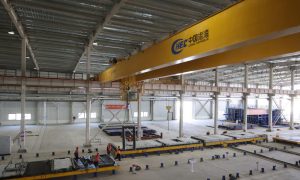Man-ning it up
When it comes to job credentials, David Semple is simply the ideal man to be the vice president of sales for Manitowoc’s operation across the Middle East and North Africa.

When it comes to job credentials, David Semple is simply the ideal man to be the vice president of sales for Manitowoc’s operation across the Middle East and North Africa.
The Frenchman got his first taste of the Middle East in 1998 after an internship at the French Embassy in Damascus, Syria. It was there that he fell in love with the region and when he later got a job at crane manufacturer Potain he jumped at the chance to set up an office in the Lebanon.
The Lebanon taught him, that while he was selling the dream of building high, the real value was being on the ground. In the years that followed he often would travel across to customers from all over the region by car, overseeing deliveries, installations and maintaining contacts. Manitowoc’s operation is now based in Dubai and from there he maintains a keen interest in a region that is now vastly different from the one he first encountered almost a decade and a half ago. Starting by looking at its closest, Semple has good news for those in the UAE.
“The feeling, let’s use the word vibe is that it is picking up,” he begins. “Some projects that were frozen are being put back into movement. I think for those living here you see the simple things like the traffic, the occupancy in hotels and restaurants; you really see that the place is getting going again. There is a good feeling in the market. Has it translated into our business on the tower crane side? I would have to say no.”
Manitowoc’s Potain brand of cranes – which are driven by dealer NFT – has been hugely prolific in the country, dominating the skyline of both Dubai and Abu Dhabi. Their work continues in the recovery says Semple, although he muses that most of them deployed in 2012 are older relics of the past boom.
“They’re not very old. Probably four, five maybe six years old which is nothing,” he notes.
Through its Potain brand, Manitowoc enjoyed a relatively buoyant 2010 and 2011 as it scored a string of large project deals such as the Princess Noora University development in Saudi Arabia. 2012 has proven to be a much tougher year.
In any given year he says Saudi can be a 200 crane market, but then remarks that mega projects in Saudi, which can absorb 150-250 cranes on one job site can transform the market. “On one site you are most likely talking about 50% or 100 new cranes. There are few markets that support multi-unit orders in the hundreds in the world. That makes the Middle East unique.
“There are other markets that are public sector driven like Algeria, at one time, Egypt and Pakistan, where you will get orders in batches. It’s a tender process where you either sell zero or 20/30 cranes.”
There are currently 52 luffing jib cranes on the King Abdullah Financial District with contractor Saudi Bin Ladin Group, which he says were supplied brand new in 2010. He adds that it is also a ‘flagship site’ for the company. Another key benchmark project is the $11billion Princess Nora Bint Abdul Rahman University, which absorbed 180 different machines including not just Potain tower cranes, but also an array of all-terrain cranes.
“That was an extremely challenging project,” he explains. “It may have stretched beyond the initial target, but it was an extremely challenging project that went extremely fast. With cases like that and the KAST project (the King Abdullah Science and Technology institute), you really get a mixture {in Saudi Arabia].”
The past year has seen these kinds of projects grow thinner on the ground and with some planned projects “on the cards for months, that become several years.”
The success of its KSA deployments have been tempered by a prolonged slowdown in demand for tower cranes.
“2011 never quite happened. We had a couple of university projects with a contractor called Nesma [a Saudi contractor and oil & gas specialist] who took 12 tower cranes in one go. In 2012 unfortunately we haven’t had those sorts of multi-crane deals. For me, this year we have still lacked some of the mega projects that we saw in Saudi Arabia particularly in 2009 and 2010. Projects of that magnitude have not quite come back into the forefront.”
He says that mobile demand is helping to ease “depressed” sales of its tower crane lines. He explains, sales of its Grove cranes have benefited from a shift to projects that suit rough terrain mobile cranes. The cranes are especially suited to oil and gas work, he says, although he has noticed a shift with demand increasing from the residential sector.
“Business overall is challenging for some product lines and quite acceptable for others,” he says. “We’re trying to adjust the change in centre of gravity between the tower and the mobiles. Our tower business is quite depressed because there are a lot left over from the boom years, whereas mobile cranes are going quite well. They need to be replaced after several thousand kilometres, so I think there’s natural renewal of fleets.”
While mobile cranes are commonly found in auction houses, tower cranes are moved via specialist agents. Noting the high levels of inventory in the market, he claims that local contractors and operators are learning about the difficulty of shifting used Chinese cranes. Many of which have taken share from the traditional tower crane powerhouses of the west.
“I’m trying not to do a sales pitch here but three or four years ago you had a lot of people moving to the value proposition to lower their initial investment and get a higher return. But now they are learning it is not so easy to sell once they try to get out the used crane. Even through the best specialist dealers or websites, their Chinese cranes are not moving. There’s no interest. It is a buyer’s market and out of the supply there is people will always pick a Potain or a Liebherr rather than a Zoomlion or a XCMG crane.”
Given its recent successes there, it is not surprising that Semple and Manitowoc are keeping an eye on the investment into hospital building Saudi.
He adds: “The other market we are watching very closely is Qatar. The feedback from my guys is that it is pretty disappointing at the moment. It is paradoxical. The masterplan is really impressive for the next decade, but the demand is nothing. There are a lot of mobile cranes from the previous boom in 2005/6, but they are borderline now in terms of being useful for new developments. So we’re certainly watching it – they have the money, the vision – but as of now, the contractors and rental companies are telling us there are no signs that a boom will be anytime soon.”
He continues: “I think there will be a very sudden unlocking of funds. In a way it reminds of Kuwait in terms of their vision and the needs they have. They’ve been planning the world’s biggest refinery there for ten years and it still hasn’t happened. We plan it that it will be the cherry on the cake – if it ever comes out.”
His region-wide brief makes him a valuable resource when it comes to markets further. He highlights the potential of one too frequently disregarded.
“The Algerian government wants to build 3 million houses in the next two or three years. It also has that backbone of oil and gas.”
Talking of oil and gas he says that Iraq’s tripling of oil output will cause a trickle down of opportunities that will “kick start the infrastructure building. A Korean company Hanwaa won a contract for 200,000 houses in Baghdad. I think that is a really good sign. They are really moving ahead.”
Semple will be hoping that so will Manitowoc in the very near future.




















